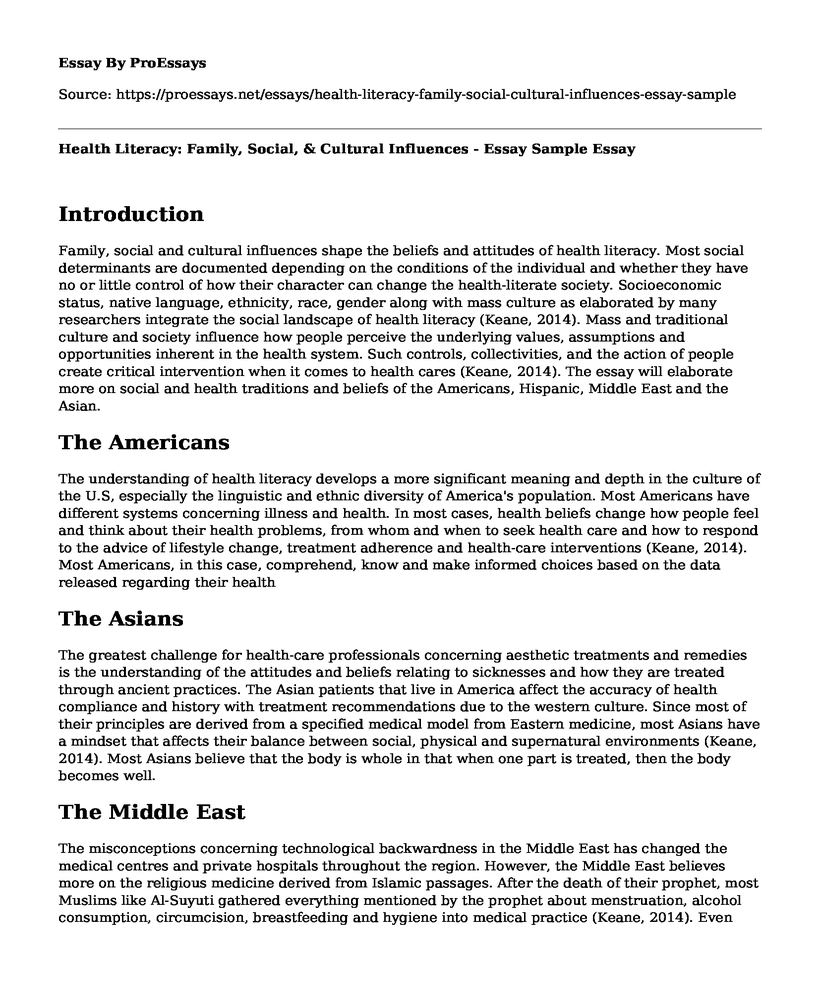Introduction
Family, social and cultural influences shape the beliefs and attitudes of health literacy. Most social determinants are documented depending on the conditions of the individual and whether they have no or little control of how their character can change the health-literate society. Socioeconomic status, native language, ethnicity, race, gender along with mass culture as elaborated by many researchers integrate the social landscape of health literacy (Keane, 2014). Mass and traditional culture and society influence how people perceive the underlying values, assumptions and opportunities inherent in the health system. Such controls, collectivities, and the action of people create critical intervention when it comes to health cares (Keane, 2014). The essay will elaborate more on social and health traditions and beliefs of the Americans, Hispanic, Middle East and the Asian.
The Americans
The understanding of health literacy develops a more significant meaning and depth in the culture of the U.S, especially the linguistic and ethnic diversity of America's population. Most Americans have different systems concerning illness and health. In most cases, health beliefs change how people feel and think about their health problems, from whom and when to seek health care and how to respond to the advice of lifestyle change, treatment adherence and health-care interventions (Keane, 2014). Most Americans, in this case, comprehend, know and make informed choices based on the data released regarding their health
The Asians
The greatest challenge for health-care professionals concerning aesthetic treatments and remedies is the understanding of the attitudes and beliefs relating to sicknesses and how they are treated through ancient practices. The Asian patients that live in America affect the accuracy of health compliance and history with treatment recommendations due to the western culture. Since most of their principles are derived from a specified medical model from Eastern medicine, most Asians have a mindset that affects their balance between social, physical and supernatural environments (Keane, 2014). Most Asians believe that the body is whole in that when one part is treated, then the body becomes well.
The Middle East
The misconceptions concerning technological backwardness in the Middle East has changed the medical centres and private hospitals throughout the region. However, the Middle East believes more on the religious medicine derived from Islamic passages. After the death of their prophet, most Muslims like Al-Suyuti gathered everything mentioned by the prophet about menstruation, alcohol consumption, circumcision, breastfeeding and hygiene into medical practice (Keane, 2014). Even though most of their practice came for the biblical Jewish medicine derived from the Book of Leviticus, succumbing to usual medication was a problem because of their beliefs.
The Hispanic
The values and beliefs unique for the Mexican American, such as the Hispanic came from the cultural themes and how their worldview is shaped. The Hispanic have various dimensions of acculturation such as country of origin, language, parental expectations, length of residence and food preferences that make treatment impossible (Keane, 2014). The familiarity of the acculturation dimensions and continuum within the Hispanic can assist in enhancing and facilitating the communication with the patients
Conclusion
Health care facilities get a lot of challenges when it comes to the treatment of patients that come from various backgrounds. Socioeconomic status, native language, ethnicity, race, gender along with mass culture, in other words, integrate the social landscape of health literacy. It is, therefore, essential to understanding the concepts of health literacy and how it develops a more significant meaning and depth of various cultures.
References
Keane, A. H. (2014). The world's peoples. An accessible account of their bodily and mental characters, beliefs, Traditions, political and social institutions. Bulletin of the American Geographical Society, 40(8), 505-588. DOI: 10.2307/197353
Cite this page
Health Literacy: Family, Social, & Cultural Influences - Essay Sample. (2023, Apr 25). Retrieved from https://proessays.net/essays/health-literacy-family-social-cultural-influences-essay-sample
If you are the original author of this essay and no longer wish to have it published on the ProEssays website, please click below to request its removal:
- Implementation of the Proposed Intervention: New Equipment and Refurbishing of the Emergency Wing
- Children of Divorce Are Delayed in Many Aspects: Research Paper
- Tools to Help Nurses Gain Critical Thinking Skills Essay
- How Medical Marijuana Operates in Chemotherapy Patients? - Paper Example
- Ethics and Death - Essay Sample
- Research Paper on Social Work: Preventing Social Exclusion & Inclusion for Deviant Behaviors
- Essay on Teachers and Students: Building a Caring Relationship in Childcare Centers







